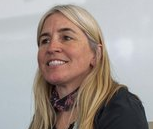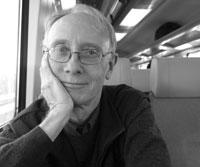Documentary Video in the Digital World and for Human Rights
The What is Documentary Conference
This past weekend had the opportunity to cover the What Is Documentary: Yesterday, Today and Tomorrow conference at the University of Oregon's Portland campus organized by Gabriela Martinez and Janet Wasko of the School of Journalism and Communication. It was an extremely interesting two days and three evenings of presentations and, yes, film screenings that included Jim Blue's The March (as in the 1963 March on Washington) and his A Few Notes on Our Food Problem; David MacDougall's film, With Morning Hearts, about children attending for the first time the prestigious Doon School in Dehradun, India (one of five films about the children); the folklorist Sharon Sherman's What Happened to Zolay? and Art Herbig's in progress documentary, Public Memory & 9/11, a product of over 70 interviews conducted with volunteers, first responders, tourists and witnesses. It was the word, witness, that taught me the most about a movement that had escaped my notice completely until Saturday morning when Kelly Matheson, Senior Program Manager, WITNESS, was the plenary speaker.
Kelly is an attorney, filmmaker and human rights advocate who previously worked with WITNESS to launch the first Video Advocacy Institute. As an attorney, she worked as a Law Fellow in Tanzania researching citizens’ rights to bring suit against their governments when governments broke their own laws. She also practiced throughout the western United States, working on issues where environmental and human rights converge. She began creating films in 2003 as part of Montana State University’s MFA Documentary Filmmaking program. Her film projects focus on indigenous and environmental rights in Central America, the United States and the Congo Basin. Kelly returned to WITNESS after working as a Fulbright researcher in Congo-Brazzaville, where she collaborated with a video-centered outreach project to determine the effectiveness of video to change health and conservation practices.
In short, Kelly is someone who is holding people accountable for human rights violations based largely on evidence provided by videographers - professionals and citizens like you and me. There are rules of evidence and through the website, Witness.org, her team is developing processes and tools to insure the videos provided by witnesses hold up in court. She discussed the initiative Camera's Everywhere a program to ensure that people turning to video for human rights use it as effectively, safely and ethically as possible and the Secure Smart Cam Project to protect the identity of citizen witnesses who are often unprepared for security and safety challenges that arise both for themselves and the people they film - including the confiscation of their devices, attack, imprisonment, revictimization, or worse. She talked about two mobile apps under development. They are:
(1) InformaCam, intended as the first mobile app seeking to address issues of authentication for digital media. Citizen-shot media sent to newsrooms, human rights organizations and courts of law is often missing vital information that would enable them to verify the story such as who shot it, surrounding context, and a reliable source of data that can answer, “Is this for real?”
(2) ObscuraCam a mobile app that allows users to blur or obfuscate faces in photos and videos. It can be used on media taken directly with the app itself, as well as imported media to your mobile phone.s
There is an excellent TEDxTeachers College talk featuring Kelly as she shares her story about theabeginning of Witness that I recommend you watch here. Through personal stories and videos she explains how climate change has an impact on the young lives of people all over the world and discusses our rights and that of our children to a sustainable living environment focusing on the process, atmospheric trust litigation (ATL).
I will write more about the people and content in my May blog posts including my interview with David MacDougall, ethnographic filmmaker and scholar of visual anthropology. Included with this blogpost is an excerpt from David's interview talking about What is Documentary.
Ruth Ann Barrett, April 29, 2014, Portland, Oregon.







